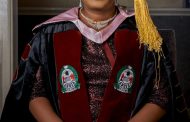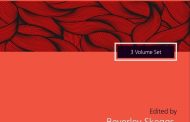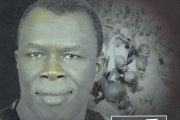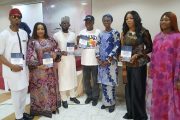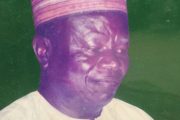It is a poetic battle group with commitments to literary instrumentalism. We call them a battle group similar to a Carrier/Naval counterpart because they are all practitioners of Literature as a boundary destabilising practice. By the time they are done, many people would have to think again, especially those who have concluded that Abuja, Nigeria’s Federal Capital city, is no more than a centre of power, intrigues, wealth and wealth display, magnificent buildings, corruption and sex. They will soon find out that they have left out a key actor – arts in general and poetry in particular. The poets are determined to give the city’s traders, politicians and hustlers a run for their money.
Whether poetry can re-imagine Abuja is not its only bother. In addition to re-imagining Abuja through poetic exertions, other immediate self-defined tasks are containing the virus called ethnicity as it unfolds in Nigeria and convincingly situating its support for the exposure of the case of plagiarism against the late colorful poetic hero, Christopher Okigbo. Okigbo has recently come under attack for plagiarism from notably Professor Chimalum Nwankwo, another heroic Nigerian literary philosopher.
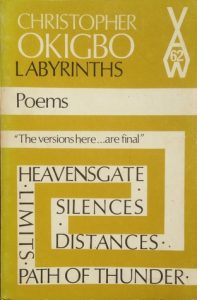

As complex as they come
The narrative is that Okigbo translated a text originally published in Greek. And that, for whatever reasons, Okigbo did not indicate that he translated the text. Instead, he put his name on the work in a manner that suggests his authorship of the text. This appears well known within the top echelon of the Nigerian literary establishment but the idea that ‘we’ should not destroy one of ‘our’ own stars appeared to make the act to remain a well guarded secret.
That was until Prof Chimalum Nwankwo came along, saying that he had to follow the logic advanced by his mother that anyone who keeps quiet about an evil is automatically complicit in it. Prof Nwankwo told Intervention that, as a literary critic, his subjectivity is understandable, dismissing the notion that he is out to dismantle Okigbo’s legacy. He says that those who suspect that he (Chimalum) might be positioning himself as a replacement of Okigo were getting it wrong. He cites the example of William Shakespeare’s anti-Semitics stereotyping in portraying Shylock in The Merchant of Venice as the archetype of the wicked Jew who was insisting on a pound of flesh until he was confronted with the impossibility of extracting exactly that much and not more or less. Or, the same stereotyping of the character Caliban as the archetype savage in The Tempest also by Shakespeare and which made him complicit in colonialism. To create stereotypes about people is not acceptable because these are things you can’t clean easily. The literary critic is bound to point out to any writer or producer of cultural products that he or she cannot go about writing that an ethnic group is stupid or that another one loves money. It is because once you create or circulate these stereotypes, they acquire meaning. So, ‘heart of darkness’ has stuck for Africans, for example, in spite of the resilience of the Africans against all manner of mistreatment.
Chimalum Nwankwo, therefore, argues that, in the critical tradition in literary studies, exposing a writer’s flaw is not about diminishing him or her or trying to take his place. Pointing out such weaknesses doesn’t mean a writer was so bad a writer. It means there are flaws which the writer should have thought about or learnt the lesson.
Otherwise, what of when I attacked Soyinka? Did it mean I also want to replace him? It was not about dismantling anybody. Very few writers escape one flaw or another. So what if you say Soyinka doesn’t have global taste or that Achebe got one thing or another wrong? That doesn’t mean he didn’t write Things Fall Apart with nearly 70 translations. He gives other examples, including some of American poets of all time such as Walt Whitman who wrote ‘The Dalliance of the Eagles’.

It is in the ‘Glossary’ of this booklet that we meet the real Prof Chimalum as a scholar
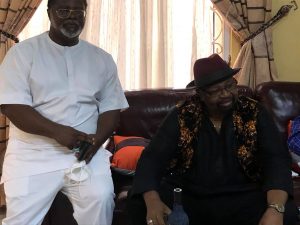
Dr. Udenta Udenta on the left and Prof Chimalum Nwankwo on the right. This was at August 26th, 2021 in Abuja
Although absolutely contemptuous of the idea of him trying to replace anyone, he acknowledges Okigbo’s erudition but that erudition doesn’t absolve him of what he did with the text. Interestingly, the poetic battle group is standing shoulder to shoulder with Prof Nwankwo on the Okigbo case.
At an August 26th, 2021 ‘Afternoon of Poetry Reading and Other Matters’ in Abuja, Dr. Udenta Udenta, a leading member of the caucus took on those he said habour the desire to punish people who said something considered unpalatable about an icon in their tribe. He mentioned attempts to stigmatise Prof Chimalum “for exposing Christopher Okigbo’s plagiarism from page 1 – to the end”. Truth, he said, has no ethnicity and must be told.
In other words, Dr. Udenta rejects the notion that as an Igbo, Prof Nwankwo should not have been the one to tell the story of what Okigbo is suspected to have done. The business of poetry is to tell the truth, not minding who is involved, he argues. It is wrong to fight Chimalum Nwankwo for exposing Christopher Okigbo’s plagiarism, he declares
The group is out with the ideology of Literature as the story teller of a nation’s past, present and the future. That way, it keeps the intellectual life of a nation alive. “Literature tends to obliterate ethnic boundaries”, he said, adding how writing can tell a better story of Abuja, the environment, the outskirt, the cultural convergence and more, similar to Dickens’ portraiture of England. Abuja doesn’t have to be soulless may be said to be the soul of group in that regard. For this reason, he implores young ones to embrace poetry so as to make it the mouthpiece of the nation.
When Dr Emmanuel Egar, the poet academic, took his turn, he said the pain about the Nigerian situation is the failure of the elite excluded from power to turn that disadvantage into advantage by creating popular culture that would have made them independent of the power of the local bourgeoisie. That, he maintains, is what the European elite excluded from the benefits of power in the event of modernity did by creating the media, education and culture in its own image, thereby constraining the bourgeoisie proper to negotiate terms of co-existence.
For Lindsay Barret, the acclaimed writer and specialist in war reporting who was also at that gathering with his wife, the point is how his generation tried to bring unity to Nigeria but couldn’t induce any ethnic group into the country they were trying to create. His argument is that if this were not the case, there shouldn’t have been the pattern of corruption being observed today: getting the money without caring a hoot how it was gotten.
In apparent endorsement of this line of thought, Prof Chimalum Nwankwo says the problem is that Nigeria itself did not go through any differentiation of ethnicity. As such, it has no idea of how to fit the different ethnic groups. Meanwhile, each of them has a self-understanding by which they act but which the Nigerian State either doesn’t know about or pretends doesn’t matter.
Prof Nwankwo is thus reminding us that the British colonialists made no mistake by its elaborate investment in profiling nearly every ethnic group in Nigeria. But the British did that for its own purpose. Where is the Nigerian State’s own sense of the different cultural groups that constitute the polity?




